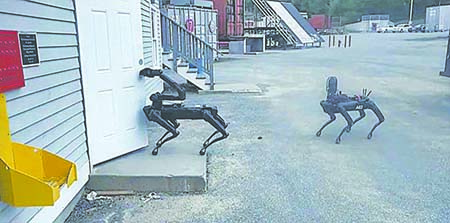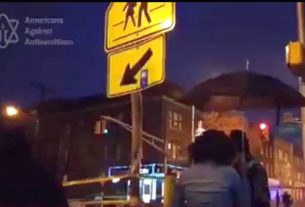Robots are becoming more prevalent in warehouses, supermarkets, and businesses, causing many to worry about privacy and job security.
The latest incident to ignite this concern? From August to November, a robotic dog worked alongside Massachusetts State Police officers to help keep Boston’s streets safe. Massachusetts State Police was the first in the U.S. to utilize a robotic dog in its work.
‘);
_avp.push({ tagid: article_top_ad_tagid, alias: ‘/’, type: ‘banner’, zid: ThisAdID, pid: 16, onscroll: 0 });
“Spot” – as the robotic dog is called – is a four-legged, semi-autonomous robot that is capable of opening doors, navigating obstacles, and traveling up to 90 minutes at a time. Spot can carry 30 pounds and comes equipped with a 360-degree, low-light camera and an extendable arm. It has been made to withstand dusty and wet environments and can sustain temperatures of -4 to 113 degrees Fahrenheit.
The Massachusetts State Police leased the robotic dog from Boston Dynamics and has since returned it. Since Spot is a “general purpose” robot, the company or organization leasing it can customize Spot with its own software. The Massachusetts State Police, however, did not do so.

According to information obtained by the American Civil Liberties Union (ACLU), Spot was used in two live incidents. A Massachusetts State Police spokesperson said the robotic dog was used as a “mobile remote observation device” to monitor suspicious activity and that the police force’s primary interest was “sending the robot into situations where you want to collect information in an environment where it’s too dangerous to send a person, but not actually physically interacting with the space.”
Spot was not equipped with a weapon, and the agreement between the Massachusetts State Police and Boston Robotics came with a clause that Spot could not be used to physically harm or intimidate people.
But that didn’t stop a slew of people from criticizing the police for using a robotic dog. The ACLU made a public records request from Boston Robotics and is demanding more transparency in how the police plan to test and deploy robotic dogs. Amongst its chief concerns are the privacy and security of the information gleaned from the robot’s camera. How exactly is the information being used? Is it being stored? Are people being spied on without their consent?
Criticism of the police’s use of Spot has spilled onto discussion forums where the robotic dog has been described as “creepy” and “terrifying.” Many comments about Spot seem to be centered on the fear that people will lose their livelihoods as robots take over more and more jobs.
Whether that is true or not (and whether lost jobs won’t, in any event, be compensated by newer and better jobs in the robotics industry) is irrelevant. As robots such as Spot become more sophisticated and have the capabilities to perform more complex tasks, the fear that they will replace humans will increase.
The encroachment of robots transcends industry. In fact, Cornell University professor and the former head of machine learning at AQR Capital Management LLC, Marcos Lopez De Prado, as well as other industry experts, contend that robots will start replacing higher-end jobs in finance.
Spot comes with myriad of impressive and exciting features and, if it works as Boston Robotics claims it does, it can help a variety of companies and organizations become more effective and gain more accurate information, especially in hazardous or unsafe areas.
Boston Robotics is currently leasing Spot to companies or organizations that might benefit from having a robot on site. Promotional material for Spot show it in a variety of positions such as on construction sites and oil or gas sites and in a variety of public safety roles.
‘);
_avp.push({ tagid: article_top_ad_tagid, alias: ‘/’, type: ‘banner’, zid: ThisAdID, pid: 16, onscroll: 10 });




